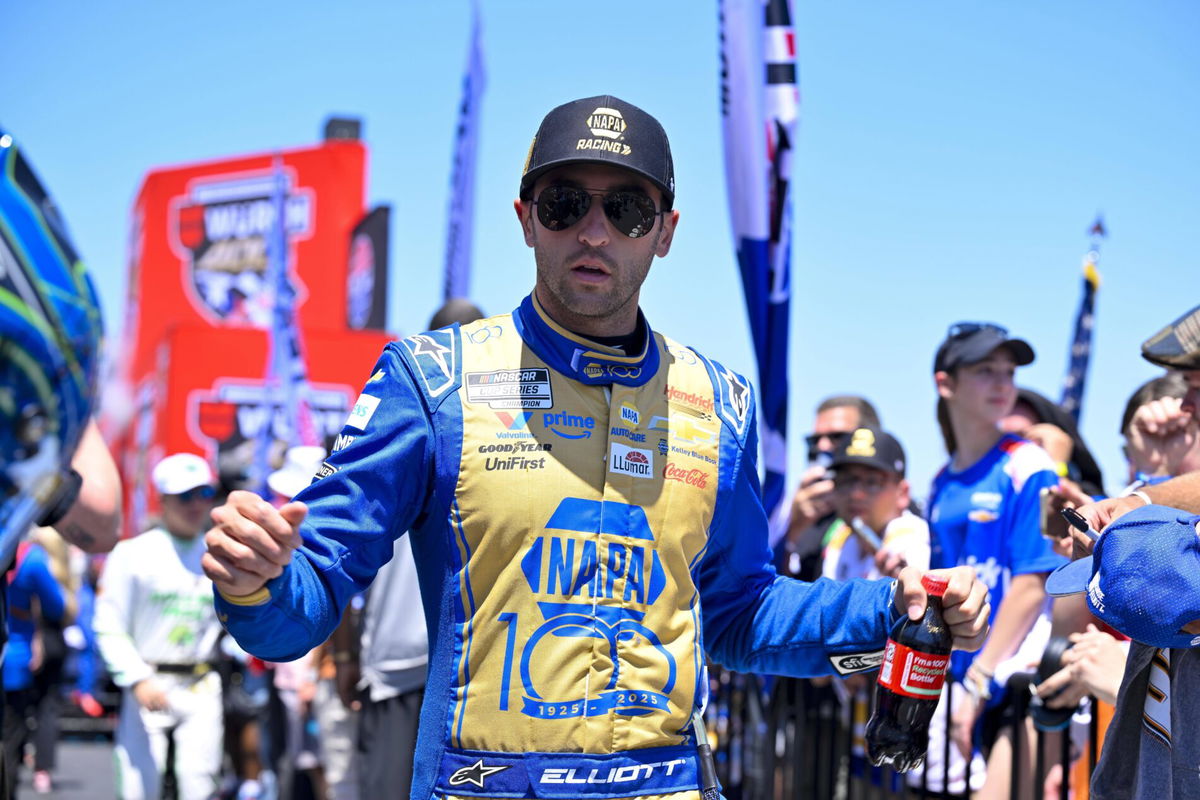
Imago
NASCAR, Motorsport, USA Wurth 400 presented by LIQUI MOLY May 4, 2025 Fort Worth, Texas, USA NASCAR Cup Series driver Chase Elliott 9 is introduced before the start of the Wurth 400 race at Texas Motor Speedway. Fort Worth Texas Motor Speedway Texas USA, EDITORIAL USE ONLY PUBLICATIONxINxGERxSUIxAUTxONLY Copyright: xJeromexMironx 20250504_jpm_an4_M27463

Imago
NASCAR, Motorsport, USA Wurth 400 presented by LIQUI MOLY May 4, 2025 Fort Worth, Texas, USA NASCAR Cup Series driver Chase Elliott 9 is introduced before the start of the Wurth 400 race at Texas Motor Speedway. Fort Worth Texas Motor Speedway Texas USA, EDITORIAL USE ONLY PUBLICATIONxINxGERxSUIxAUTxONLY Copyright: xJeromexMironx 20250504_jpm_an4_M27463

Imago
NASCAR, Motorsport, USA Wurth 400 presented by LIQUI MOLY May 4, 2025 Fort Worth, Texas, USA NASCAR Cup Series driver Chase Elliott 9 is introduced before the start of the Wurth 400 race at Texas Motor Speedway. Fort Worth Texas Motor Speedway Texas USA, EDITORIAL USE ONLY PUBLICATIONxINxGERxSUIxAUTxONLY Copyright: xJeromexMironx 20250504_jpm_an4_M27463

Imago
NASCAR, Motorsport, USA Wurth 400 presented by LIQUI MOLY May 4, 2025 Fort Worth, Texas, USA NASCAR Cup Series driver Chase Elliott 9 is introduced before the start of the Wurth 400 race at Texas Motor Speedway. Fort Worth Texas Motor Speedway Texas USA, EDITORIAL USE ONLY PUBLICATIONxINxGERxSUIxAUTxONLY Copyright: xJeromexMironx 20250504_jpm_an4_M27463
Chase Elliott’s NASCAR career has been a study in relentless reliability. Through the first 23-point-paying races of the 2025 NASCAR Cup Series, Elliott has put up a stat line that reads like a model of consistency, with 1 win, 7 top-5s, 12 top-10s, an average finish of around 10.3, an average start of 16.08, and has also completed 99.98% of possible laps with zero DNFs. Those numbers translate to 385 laps led and roughly 5,860 total laps run across the year to date, and they have left him squarely inside the championship mix in the standings, trailing only the very top contenders by single-digit margins in points. What these raw figures hide is the way Elliott’s season has been built with an unflappable ability to avoid race-ending incidents, nurse cars through trouble, and convert mid-pack starting positions into valuable top-20 and top-10 finishes. But this pattern is the product of a driver whose previous seasons combined flashes of brilliance with long stretches of dependability.
Watch What’s Trending Now!
Comparing 2025 to Elliott’s past makes the improvement clearer. In his championship year of 2020 and the surrounding seasons, Elliott has shown he can win, but the earlier campaigns featured more variance, DNFs, silly incidents, and occasional equipment failures that punctuated long runs of finishes. By contrast, 2024 and 2025 show Elliott trending toward far fewer race-ending mishaps. That evolution reflects changes at Hendrick Motorsports, with steadier setups, risk-managed pit calls with crew chief Alan Gustafson, and a team mindset that prizes points preservation as much as chase-for-the-win aggression. When everyone else is swinging for glory and occasionally crashing out, Elliott’s low-variance approach compounds into a powerful champion weapon.
Recently, a stat has become the season’s quiet headline. For the second straight season, Elliott has managed to complete all but one lap across the first 23 races. Analysts and writers have pointed out that while drivers sometimes string together long runs without DNFs, finishing essentially every lap across so many events is a rare confluence of driver discipline, team reliability, and a little luck with racing incidents. As a NASCAR insider posted on X, “For the second straight season, Chase Elliott has completed all but one lap in the first 23 races. He is the only driver in Cup Series history to accomplish this.” That near-perfect lap completion reframes a season with only a single victory into a championship narrative built on minimizing mistakes and maximizing points.
For the second straight season, Chase Elliott has completed all but one lap in the first 23 races.
He is the only driver in Cup Series history to accomplish this. pic.twitter.com/ClYAhetCk8
— NASCAR Insights (@NASCARInsights) August 8, 2025
To put that achievement in historical context, similar feats have been attempted and rarely matched. Bill Elliott’s dominant 1988 Winston Cup championship season is useful for comparison because he recorded no finishes outside the Top 20 that year and amassed a staggering body of work with six wins, six poles, and 15 top 5s. Contemporary records confirm Bill Elliott didn’t finish worse than 19th in 1988 and that his season was defined by both performance and reliability. On the other hand, while a few drivers have led every lap of isolated races, such as Cale Yarborough and Jeff Burton in certain marquee events, completing every lap across a full Cup season has not occurred. The closest cross-series analog is Matt Crafton in the Truck Series in 2013, who completed every lap in his Truck championship year. Those precedents show Elliott is threading a needle between historical rarities and modern championship math.
That chronological sweep brings us full circle to what this means for the title picture and for the fans who watch every twist of fortune. Fans who long for dramatic, must-watch passes and photo-finishes may grumble that the stat sheet lacks flash, but in a sport where a single DNF can erase months of work, a driver who shows up, finishes, and extracts maximum points has an incredibly high floor and a flexible ceiling. For now, social media sites are buzzing with praise for Elliott, calling him the ultimate “Lord Consistency.”
Chase Elliott’s ‘Ironman’ run has the NASCAR community talking
One fan perfectly captured the essence of Chase Elliott’s season when they opined on a NASCAR message board, saying, “If the championship was won by consistency, Chase Elliott would be OP.” In contrast, many of his peers have had explosive flashes, like Ross Chastain‘s last-to-first Coca-Cola 600 win, or dazzling top-five runs, but have also dealt with wrecks or mechanical failures. Elliott, by comparison, brings methodical precision to each weekend: score modestly for yourself, keep the fender clean, accumulate points. His consistency is not just valuable, but virtually overpowered.
Some fans captured the frustration that often bubbles below the surface of admiration, with one saying, “Yet people still say Alan Gustafson should fired… I get that 1 win a year isn’t gonna work, but he’s still a top 5 crew chief that most people would kill to have on their team.” That sentiment echoes a broader social-media outcry when a bold fuel-strategy call at Watkins Glen in 2023 spectacularly backfired and led to Elliott running dry before pit road, prompting pleas to fire the crew chief. Even at Dover Motor Speedway in 2025, despite leading a dominant 238 laps from the pole, Elliott’s sixth-place finish came after Gustafson called for a two-tire stop during a rain caution. The strategy cost them their chance at victory and sparked widespread criticism. But what haters don’t realize is that he is also one of the reasons that Elliott has been winning poles and a race this year.
One passionate fan summed it up bluntly, “There’s two sides of Alan Gustafson. Alan can setup a car like nobody’s business, and can make adjustments to get a mid pack car to the top 5. But his strategy calls can take a dominant car to a 7th place finish. It’s been that way since Gordon. He’s like the far extreme with both too. He understands the mechanics of a car and all that better than anyone, but his strategy calls are head scratching at best.” Even Hall of Famer Dale Earnhardt Jr. acknowledged Gustafson’s bold intent at Dover, saying, “we can’t win the race doing what everybody else is doing,” praising the aggression eve as it misfired. Those episodes of mishap illustrate the duality that Gustafson’s mechanical acumen regularly elevates cars into contention, yet his aggressive, sometimes contrarian strategic calls invite second-guessing, especially when, unlike the setup gains, the outcomes don’t stick.
A fan’s comment that “Wow, that’s very impressive. Chase is this generation’s Mark Martin / Matt Kenseth,” hits home when you break it down. Like Martin, Elliott radiates a quiet, under-the-radar consistency. Martin, who never won a Cup championship but racked up 40 wins and finished second in points five times, was revered for longevity and error-free performances deep into his fifties. Meanwhile, Kenseth‘s 2003 championship came in the old-school ways, winning just one race but leading the standings for 33 straight weeks and matching the record with 31 lead-lap finishes. In 2025, Elliott’s lap-by-lap reliability echoes those legacies intricately.
Another fan’s tongue-in-cheek observation captured both admiration and racing superstition: “Another fun stat (although not likely). If Elliott can finish 20th or better in every race for the season, he would become the 2nd driver ever to finish top 20 in every race for a whole season. The first was Bill Elliott in 1988. So naturally he’s gonna finish 30th this week at one of his best tracks.” What makes the quip sting with accuracy is the fact that Chase Elliott indeed notched his 20th consecutive top-20 finish in the 20th race of 2025. It was a modern consistency feat that draws direct comparisons to Bill Elliott’s clean 1988 season, where he finished no worse than 19th and claimed the championship with six wins and a staggering 6.6 average finish.
Chase Elliott’s near-flawless run in 2025 has etched his name alongside NASCAR’s most consistent legends. Whether fate lets him finish the story or not, fans know they are witnessing a rare kind of greatness.



